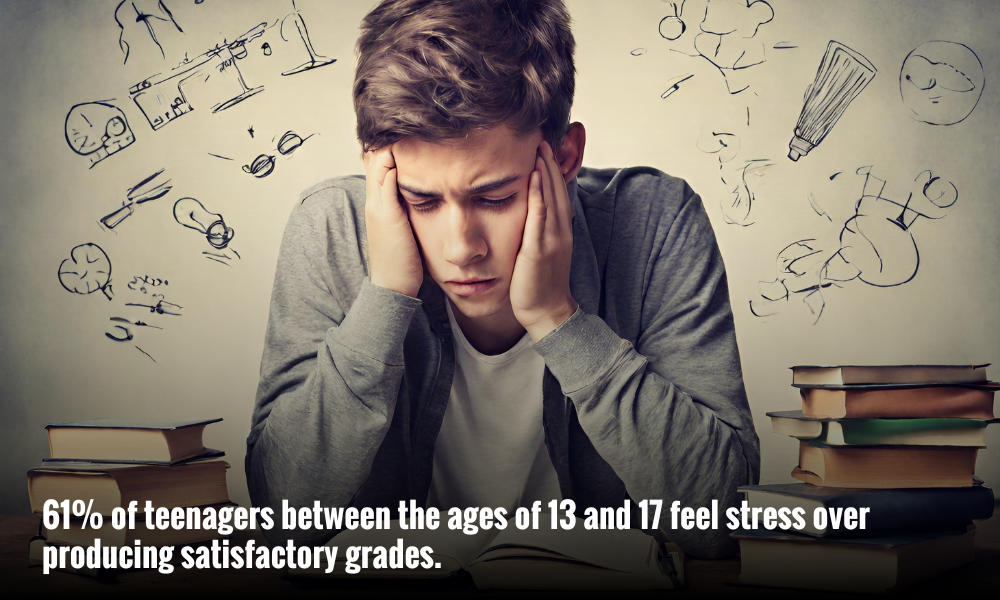In the whirlwind of teenage years, with exams, social pressures, and personal growth, mental wellness often takes a backseat. However, it’s crucial to prioritize mental health just as much as physical health. 45% of students in high school admit to being stressed almost every day in school. Taking care of your mind can lead to better overall well-being, improved relationships, and enhanced academic and personal achievements. Let’s delve into the importance of mental health and explore some self-care strategies specifically tailored for teenagers.
Why is Mental Health Important?
Mental health affects every aspect of our lives. It influences how we think, feel, and act. Good mental health allows teenagers to cope with stress, make meaningful relationships, and handle life’s challenges effectively. On the other hand, neglecting mental health can lead to problems like anxiety, depression, and decreased academic performance.

Moreover, adolescence is a critical period for brain development. Investing in mental health during these years can set the foundation for a healthier adulthood. So, making mental wellness a priority is not just about feeling good now; it’s about building a resilient future.
Types of Self-Care in Mental Wellness
Self-care isn’t a one-size-fits-all approach. Different types of self-care cater to various aspects of well-being and mental wellness. Let’s discuss a few.
- Physical Self-Care: This involves taking care of your body through exercise, proper nutrition, and adequate sleep. Physical activity can boost mood, reduce stress, and improve sleep quality.
- Emotional Self-Care: Recognizing and expressing your emotions is essential. This can include journaling, talking to a trusted friend or adult, or practicing mindfulness and meditation.
- Social Self-Care: Building and maintaining healthy relationships is crucial. Spending time with friends and family, joining clubs or groups, and engaging in social activities can improve your social connections and overall happiness.
- Intellectual Self-Care: Stimulating your mind through learning, reading, or engaging in creative activities can enhance cognitive function and provide a sense of accomplishment.
Strategies for Teenagers
Now that we’ve covered the types of self-care, let’s explore some practical strategies teenagers can follow to nurture their mental wellness:
- Establish a Routine: Creating a daily routine can provide structure and stability. Include time for schoolwork, relaxation, physical activity, and socializing.
- Limit Screen Time: While technology is an integral part of modern life, excessive screen time can contribute to stress and sleep problems. Set boundaries for screen use and take breaks to rest your eyes and mind.
- Practice Mindfulness: Mindfulness techniques, such as deep breathing, meditation, and yoga, can help manage stress and improve focus.
- Stay Connected: Talk to friends and family regularly. Share your feelings and experiences, and listen to theirs. Social support is essential for mental well-being.
- Seek Help When Needed: If you’re struggling with your mental health, don’t hesitate to seek help. Talk to a counselor, therapist, or trusted adult. Remember, asking for help is a sign of strength, not weakness.
- Engage in Hobbies: Find activities that you enjoy and make time for them regularly. Whether it’s playing a musical instrument, painting, or playing a sport, hobbies can be a great way to relax and recharge.
The Distorted Landscape of Teenager Mental Health in 2024
In recent years, the landscape of teenage mental health has seen significant shifts, influenced by various factors unique to the modern era. The digital age, social media, academic pressures, and global events have all contributed to a more complex and sometimes distorted perception of mental health among teenagers. Let’s delve deeper into these challenges and understand how they impact teenagers’ mental well-being in 2024.
Digital Age and Social Media
The rise of the digital age has brought both opportunities and challenges for teenagers. While technology has made information more accessible and connected people worldwide, it has also introduced new stressors. Social media platforms can create unrealistic expectations, leading to feelings of inadequacy, comparison, and FOMO (Fear of Missing Out).
Constant exposure to curated and often unrealistic images of success, beauty, and happiness can distort teenagers’ perceptions of themselves and their lives. This can contribute to increased levels of anxiety, depression, and low self-esteem.
Academic Pressures
In 2024, academic pressures continue to be a significant source of stress for teenagers. The competitive nature of education, coupled with the fear of future uncertainties, can lead to burnout and mental exhaustion. The pressure to excel academically, participate in extracurricular activities, and build an impressive resume for college or future careers can be overwhelming.

Moreover, the transition to online learning due to global events like the COVID-19 pandemic has added another layer of complexity. Adapting to remote learning, managing screen fatigue, and maintaining motivation in isolation have posed new challenges for teenagers.
Global Events and Uncertainties
The past few years have been marked by unprecedented global events, from pandemics to climate crises and social upheavals. These events have not only disrupted daily life but also heightened feelings of uncertainty, fear, and insecurity among teenagers.
Living through these uncertain times can lead to heightened levels of stress, anxiety, and feelings of helplessness. The constant barrage of news and updates can be overwhelming, making it challenging to maintain a sense of normalcy and stability.
Final Words
In 2024, teenage mental health faces a distorted landscape shaped by the digital age, academic pressures, and global uncertainties. It’s more important than ever to recognize these challenges and provide teenagers with the support and resources they need to navigate this complex terrain.
By understanding the unique challenges faced by teenagers today and fostering an environment of openness, understanding, and support, we can help them build resilience, cope with stressors effectively, and prioritize their mental well-being. Together, we can work towards creating a healthier, more balanced approach to teenage mental health in the modern world.
Nurturing mental wellness is crucial for teenagers’ overall well-being and future success. By prioritizing mental health and practicing various self-care strategies, teenagers can build resilience, manage stress effectively, and lead happier, healthier lives. Remember, taking small steps towards self-care can make a significant difference in how you feel and cope with life’s challenges. So, start incorporating these tips into your daily life and watch as your mental wellness flourishes!
More relevant blogs:
























